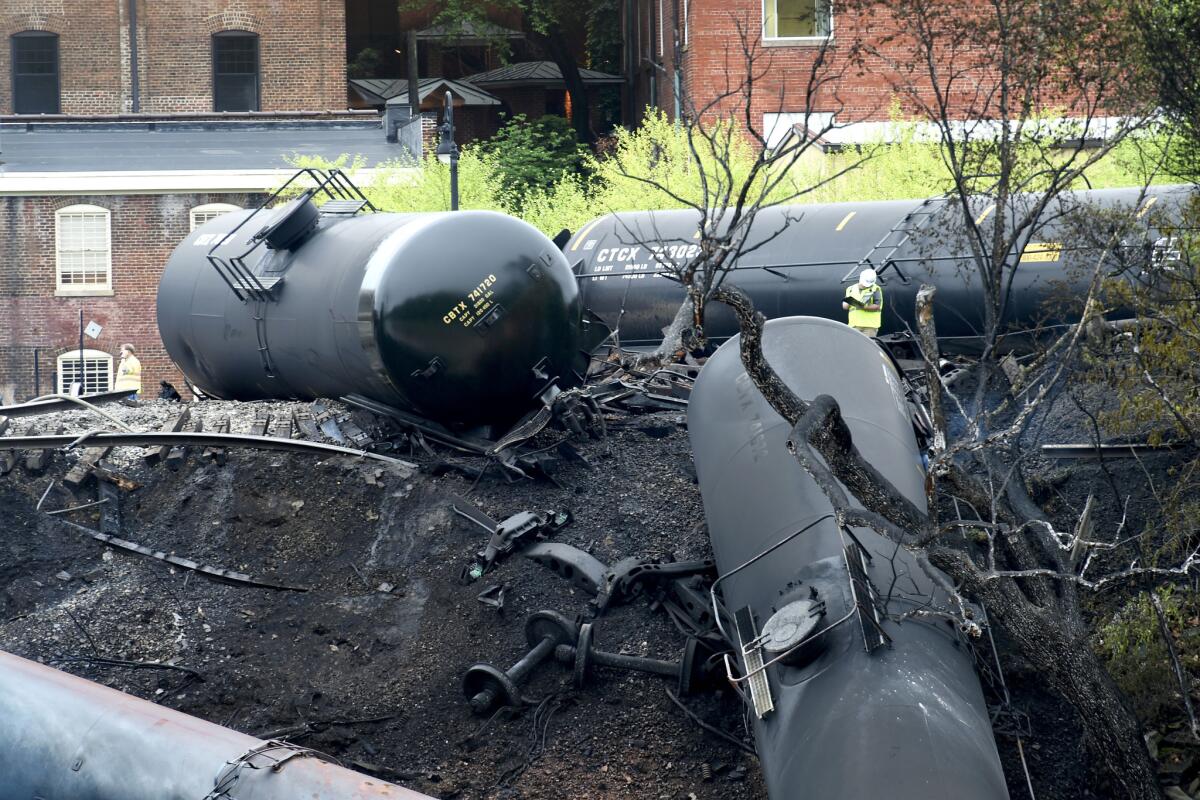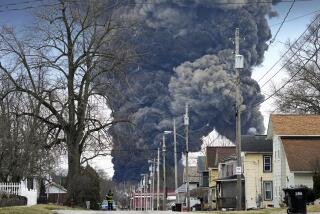No serious impacts after Virginia oil train derailment, officials say

Nearly a tanker’s worth of crude oil may have spilled into the James River or burned off after a train derailment in Virginia this week, but authorities have not detected any serious environmental impacts.
“At this time we expect downstream impacts to the environment and drinking water to be minimal or undetectable,” Gov. Terry McAuliffe said Friday. “Local, state and federal entities are monitoring and sampling the James River for any impacts, and Virginia’s drinking water continues to be safe.”
Patches of oil have been seen at least 12 miles downstream of downtown Lynchburg, Va., according to the Virginia Department of Environmental Quality. But heavy rainfall in recent days left the river gushing and overflowing, helping to dissipate the oil. Officials also quickly set up berms around the disaster site to pool the oil.
Seventeen of the 105 oil tankers coupled together on the CSX Transportation train bound for the Virginia coast jumped the tracks on Wednesday afternoon. Three of the black, cylindrical cars fell into the river, and two remained perched on an unstable riverbank Friday afternoon as authorities assessed how to remove them without spilling any more oil.
The two remaining tankers are full of crude oil extracted from the Bakken shale region in North Dakota, officials said. That region’s oil tends to be lighter and more flammable than crude from elsewhere.
“Extra precautions are being taken to keep as much of it out of the river as possible,” said Bill Hayden, a spokesman for the state’s environmental quality agency.
CSX also said Friday that it had begun laying a new track. The damaged track will be hauled off by federal investigators, who will try to put the jigsaw puzzle of parts back together to see, among other things, if the railway may have sunk after growing swollen with heavy rainfall.
Investigators also plan to check the results of a review of the track done the day before the derailment, said Jim Southworth, a U.S. National Transportation Safety Board investigator.
Though the spill from the single breached tanker ignited a towering fire, no one was injured.
“This could have been a whole lot worse,” Lynchburg Mayor Michael A. Gillette said.
Federal investigators have not found any problems with the crew’s actions before the derailment or with the mechanical systems of the cars not involved in the accident. The train was traveling within the 25 mph speed limit and obeying signal lights, which were properly functioning, Southworth told reporters Friday afternoon.
The incident in Virginia is being used by environmentalists and local officials as fresh evidence that federal authorities must rapidly toughen regulations for rail-freight carriers.
Though some critics have hoped that new pipelines could take over the expanding job of hauling crude, at least one major project now appears even further away.
TransCanada said Friday that a long-delayed pipeline project to carry crude from Alberta’s oil sands has little chance of beginning construction this year.
Russ Girling, the company’s chief executive, said the project will require two full construction seasons to build, putting off the earliest completion date to the end of 2016.
Girling told reporters that the pipeline’s customers have ordered thousands of tank cars to move the Canadian oil to market, but they remain committed the project. Girling said the pipeline will be cheaper and safer to operate than using trains to transport the crude.
In February, a Nebraska judge struck down a state law that allowed Republican Gov. Dave Heineman to approve the pipeline’s route, bypassing the state’s Public Service Commission. The state’s attorney general is appealing the decision. The Obama administration has delayed any decision on the project, pending the state court ruling.
The long delays in the project since it was announced five years ago have driven up the $5.4-billion cost. It has also forced the company to finance its $2-billion investment far longer into the future, while maintaining its workforce and required equipment to be stored in warehouses. Girling would not rule out future legal action to recover those costs.
Follow LATimes National on Facebook
ALSO:
2 Alaska state troopers killed in remote village of Tanana
Some high school senior pranks go too far, resulting in arrests
Oil drilling near Everglades prompts worries about fracking, water
More to Read
Sign up for Essential California
The most important California stories and recommendations in your inbox every morning.
You may occasionally receive promotional content from the Los Angeles Times.












